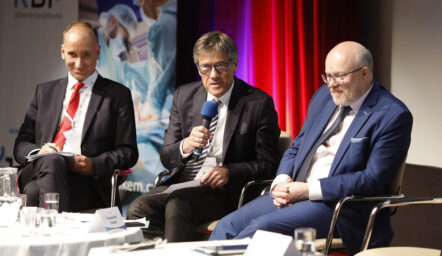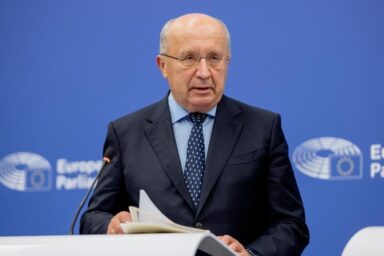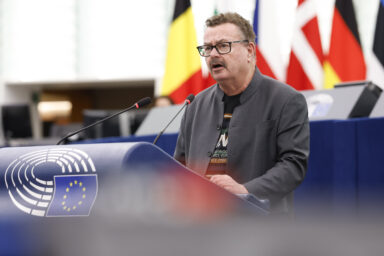Preventing medicine shortages is the European Parliament’s key priority, says MEP Veronika Cifrová Ostrihoňová (Renew/SK). She discussed the Critical Medicines Act and much more in the latest EU Perspectives podcast. The episode featured Arnaud Maheas, head of public affairs Europe at Sandoz and Chair of Medicines for Europe’s Market Access Committee, and Stefano Romanelli, senior government affairs manager of the European Confederation of Pharmaceutical Entrepreneurs.
Bridging healthcare disparities is not just a policy goal—it’s existential for the EU’s credibility, Ms Ostrihoňová says. The Critical Medicines Act is a litmus test for European solidarity. Her focus is unwavering: healthcare must be viewed through the lens of equality, security, and shared responsibility. Without equitable access to medicines, the bloc risks fracturing along economic and geographic lines.
The CMA’s success hinges on balancing national sovereignty, industry interests, and public health imperatives—a daunting task, but one she sees as non-negotiable. “Starts matter,” the MEP from Slovakia, who is a member of EP’s SANT committee, insists. “And this is a start.”
“Health inequalities are destroying the European idea itself,” she said. “If a European citizen’s access to healthcare depends on the postcode where they were born, the credibility of the European project is endangered.” For her, the disparities in medicine access across the EU are not just policy failures—they are existential threats to the bloc’s unity.
Access disparities
The focus is on the Critical Medicines Act (CMA), a legislative proposal aimed at addressing drug shortages and supply-chain vulnerabilities. But she is clear: this is not a cure-all. “It’s an important first step. But we need more than laws—we need a fundamental shift in how Europe views healthcare.”

The urgency, she argues, stems from glaring inequalities. “When you look at just the region of Central and Eastern Europe, the differences are vast. I come from Slovakia, and I know it will take years for my country to reach Estonia’s level of healthcare access,” she told the podcast. Medicines approved quickly in one member state face delays elsewhere, or never reach others. “In some countries, a drug is available in 60 days. In others, it takes 180 days—or never arrives,” she asserts.
It will take years for Slovakia, my country, to reach Estonia’s level of healthcare access. – MEP Veronika Cifrová Ostrihoňová
Empty slogan?
These disparities, she insists, corrode trust in the EU. “Citizens see this and ask: What does the single market even mean? If your birthplace determines whether you get life-saving treatment, solidarity becomes an empty slogan,” she minced no words.
The CMA, proposed in March, seeks to address these gaps. It identifies a Union-wide list of critical medicines—70 per cent of which are generics—and aims to reduce reliance on imports from Asia, which supplies 60-80 per cent of the bloc’s pharmaceuticals.
You might be interested
Ms Ostrihoňová’s priority is joint procurement, a mechanism tested during the covid-19 pandemic: “Without it, smaller member states like Slovakia would have been priced out of vaccines. Wealthier countries would have bought up stocks. Joint procurement ensured fairness.”
Balancing interests
Yet resistance persists. Member states guard healthcare as a national competence. Some fear losing control, others doubt the tool’s efficacy. “Joint procurement isn’t a silver bullet. Healthcare is complex—there are 27 different systems. But covid-91 proved that collaboration works. Why not apply it to generics like insulin?” she asked a bold question.

The CMA, she stresses, must balance industry interests with public health. “Pharma companies avoid Slovakia because our prices are low. They prioritize Germany or France, where profits are higher. But medicines aren’t luxury goods—shortages kill. If a child in Bratislava can’t get antibiotics, we’ve failed,” the MEP exhorted.
Her solution hinges on dialogue: “We need to tell companies: You have an obligation to supply all countries, even if profits are lower. Healthcare isn’t a regular market. Lives are at stake.”
Joint procurement, pros and cons
The EU’s limited authority complicates matters. Healthcare remains firmly in member states’ hands, and harmonisation is voluntary. “We can’t force alignment. But we can frame this as a competitiveness issue. If Eastern Europe’s workforce is sicker, productivity drops. That hurts everyone.” Her pragmatic approach focuses on transparency. “Even simple steps—like mapping drug stockpiles—could prevent crises. If Sweden has surplus insulin and Bulgaria has none, why not share? That’s solidarity.” But scepticism lingers. “Some states distrust Brussels. Others fear losing bargaining power. Still, COVID showed joint action saves lives.”
Not everyone was on the same page about joint procurement. Stefano Romanelli of EUCOPE voiced his reservations: “There is a lot of talk on joint procurement or collaborative procurement of innovative medicines. And I will be very honest here in saying that, to me, this is not the silver bullet, it is not the solution to improve access across all European member states,“ he said. “There are huge access disparities. There are access issues in some countries. This needs to be solved, but there are a lot of aspects that need to be taken into account, like national budgets and national priorities, before talking about joint procurement. If we first don’t solve the underlying issues of access, then joint procurement is not the solution.“
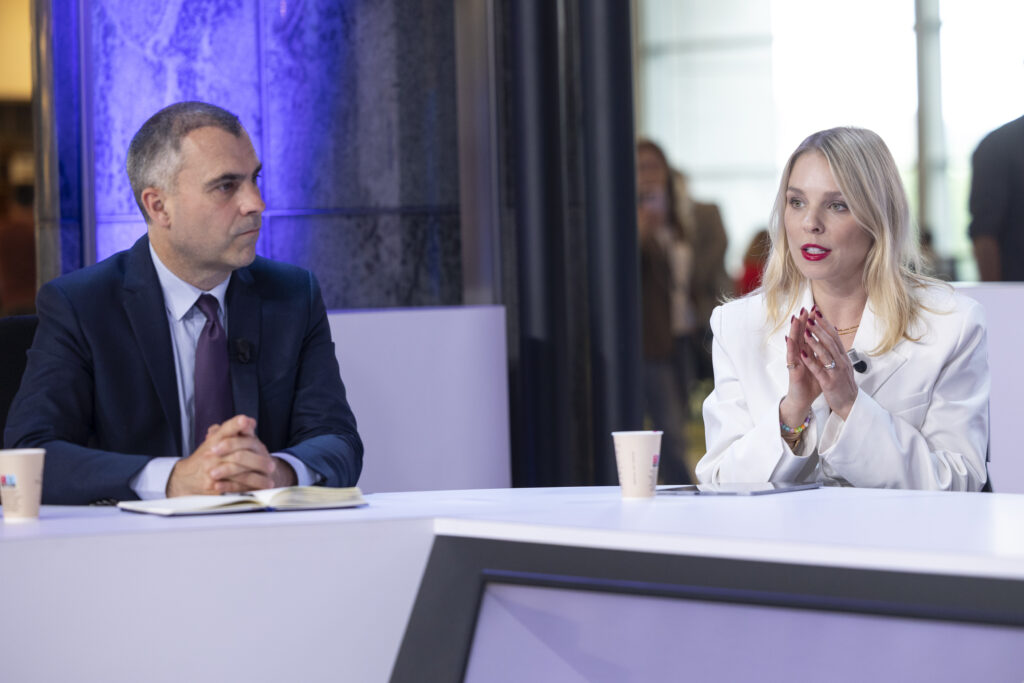
(Joint procurement) it is not the solution to improve access across all European member states. – Arnaud Maheas, Sandoz
Words on paper
Funding is another hurdle. The EU’s next multi-annual financial framework, due in July, must balance competing priorities—defence, green transition, debt repayment. Health budgets risk cuts.
“We’re fighting to keep existing funds, not increase them. Programmes like EU4Health, which funded cancer screenings, are vulnerable. Without investment, the CMA becomes words on paper,” Ms Ostrihoňová says.
The red line is drawn around protecting pandemic preparedness and research. “Antimicrobial resistance kills thousands yearly. We can’t ignore that. But without member-state cooperation, even this falters,” she told her co-podcasters.
Divided competences
And they responded. Arnaud Maheas of Sandoz, contributed his point of view.“There are things that member states can do, and there are things that the EU can do. But the EU can do a lot already. And I think that the Critical Medicines Act, again, is a starting point. Procurement is an EU competence, and the EU can define how you procure medicines,“ he said.
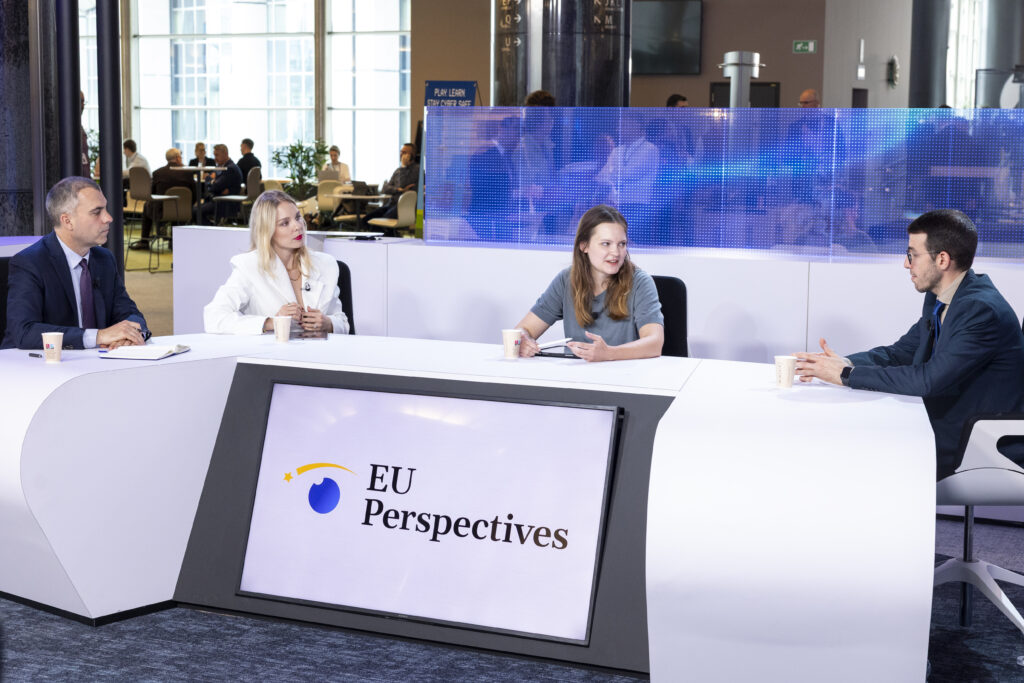
“As to off-patent medicines—about 30 or 40 per cent of all medicines—most of them go to hospitals, they go through a procurement procedure,“ Mr Maheas elaborated on his point. „And here you can say, it’s not just the price. So you have to add other criteria and check if the supply is secure, if the environmental norms are followed, or if we go beyond expectations. This should be rewarded—and this is EU competence,“ he argued.
For Ms Ostrihoňová, however, the stakes transcend healthcare. Rising anti-EU sentiment in Eastern Europe alarms her. “When people feel abandoned, they turn to populists. Healthcare isn’t just about hospitals—it’s about proving the EU works.” Distrust in Brussels’ crisis management is higher in the East than the West. “Every drug shortage, every disparity, chips away at solidarity,” she urged.
Security risk
The CMA’s fate hinges on balancing competing interests. “We’re stuck between member states’ egos and corporate bottom lines. But if we fail here, the European project loses meaning,” Ms Ostrihoňová warns.
The Act’s proposal for a Union-wide list of critical medicines aims to reduce reliance on Asian imports. “Depending on Asia for 60-80 per cent of our medicines is a security risk. Joint procurement could mitigate this,” she maintanied.
Yet challenges abound. “States resist ceding control. Some see it as a loss of sovereignty. Others fear delays. Pharma argues strict rules stifle innovation. But when profits dictate who lives, we’ve failed,” she said resolutely.
Mapping stockpiles
The MEP then returned to Slovakia’s plight. “Our medicine prices are among the EU’s lowest. Companies prioritize richer markets. But this isn’t just economics—it’s life or death,” she said. The CMA’s emphasis on transparency could help, though.

Mapping stockpiles might prevent shortages too, she contends. If one country has surplus, others shouldn’t suffer; but implementation is tricky. “States guard data closely. Trust is lacking,” Ms Ostrihoňová said.
Budget battles loom. “Health competes with defence and climate funds. Protecting existing allocations will be tough,” the Slovak politician restted her focus. “Preserve EU4Health and Horizon Europe. Research into rare diseases can’t wait.” Public-private partnerships offer hope, though: “Strategic R&D investments could boost competitiveness. But without state aid harmony, progress stalls.”
Cautious optimism
The CMA’s symbolic weight matters. “It’s about proving Europe cares for all citizens. If we can’t ensure medicine access, what’s the point of the single market?” Populists exploit these gaps. “In Slovakia’s election, anti-EU parties gained ground by highlighting vaccine shortages. Disillusionment feeds extremism.”
Ms Ostrihoňová remains cautiously optimistic. “The CMA isn’t perfect, but it’s a start. We’re fostering dialogue—between states, industries, institutions. That’s progress.” Compromise is inevitable. “We might phase in joint procurement, starting with critical drugs. Exceptions for smaller firms could ease industry fears.”
Companies prioritize richer markets. But this isn’t just economics—it’s life or death. – MEP Veronika Cifrová Ostrihoňová
The broader lesson, in her eyes, is that “healthcare isn’t a national issue—it’s a security priority. A healthy workforce underpins competitiveness. A secure Europe needs resilient health systems.” As negotiations continue, Ms Ostrihoňová’s message is clear: “The CMA isn’t about centralisation or punishment. It’s about survival. A union that can’t heal its people has no future.”

